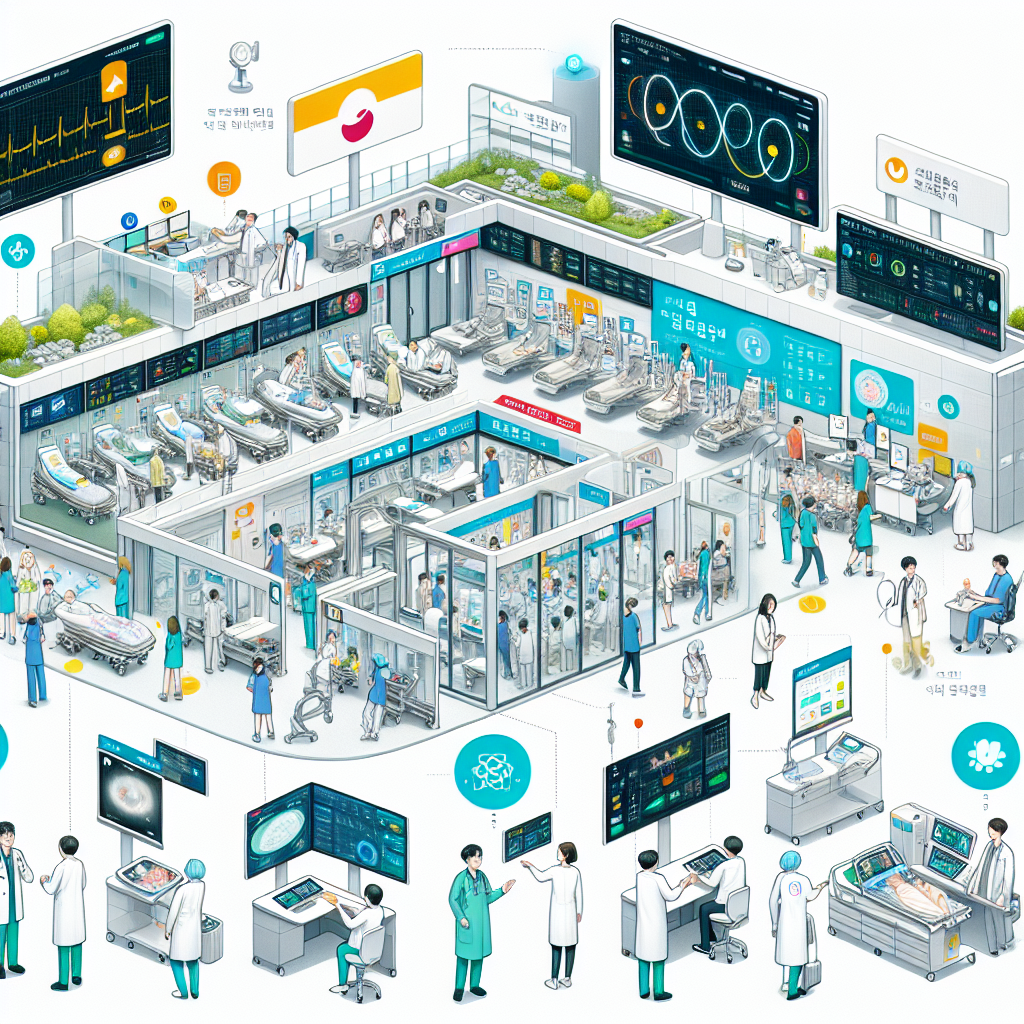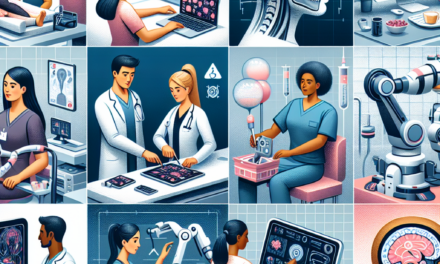South Korea’s Multi-Million Dollar Smart Hospital Emergency System Projects and Other Updates

South Korea has long been at the forefront of technological innovation, and its healthcare system is no exception. The country is investing heavily in smart hospital emergency systems, aiming to revolutionize patient care and streamline medical processes. This article delves into the intricacies of these projects, exploring their impact on healthcare delivery, the technology driving these innovations, and the broader implications for the global medical community.
The Rise of Smart Hospitals in South Korea
South Korea’s healthcare system is renowned for its efficiency and quality, and the integration of smart technology is set to enhance these attributes further. Smart hospitals utilize advanced technologies such as artificial intelligence (AI), the Internet of Things (IoT), and big data analytics to improve patient outcomes and operational efficiency.
One of the primary drivers behind the rise of smart hospitals in South Korea is the government’s commitment to healthcare innovation. The Ministry of Health and Welfare has allocated substantial funds to develop and implement smart hospital systems, recognizing their potential to transform healthcare delivery.
Smart hospitals in South Korea are characterized by their use of cutting-edge technology to enhance patient care. For instance, AI-powered diagnostic tools can analyze medical images with remarkable accuracy, assisting doctors in making more informed decisions. Additionally, IoT devices enable real-time monitoring of patients’ vital signs, allowing for timely interventions in emergency situations.
Moreover, smart hospitals are designed to optimize operational efficiency. Automated systems streamline administrative tasks, reducing the burden on healthcare professionals and allowing them to focus on patient care. This not only improves the quality of care but also reduces costs, making healthcare more accessible to the population.
- AI-powered diagnostic tools
- IoT devices for real-time monitoring
- Automated administrative systems
In summary, the rise of smart hospitals in South Korea is a testament to the country’s commitment to healthcare innovation. By leveraging advanced technologies, these hospitals are poised to deliver superior patient care and operational efficiency, setting a benchmark for the global healthcare industry.
Key Projects and Investments in Smart Hospital Emergency Systems
South Korea’s investment in smart hospital emergency systems is a multi-faceted initiative involving several key projects. These projects are designed to enhance emergency response capabilities, improve patient outcomes, and streamline healthcare delivery.
One of the most significant projects is the development of a nationwide emergency medical information system. This system integrates data from various healthcare providers, enabling seamless communication and coordination during emergencies. By providing real-time access to patient information, healthcare professionals can make informed decisions quickly, improving the chances of positive outcomes.
Another notable project is the implementation of AI-powered triage systems in emergency departments. These systems use machine learning algorithms to assess the severity of patients’ conditions, prioritizing those who require immediate attention. This not only improves the efficiency of emergency departments but also ensures that patients receive timely care.
In addition to these projects, South Korea is investing in telemedicine platforms to enhance emergency care. These platforms enable remote consultations with specialists, allowing for expert guidance in critical situations. This is particularly beneficial in rural areas, where access to specialized care may be limited.
- Nationwide emergency medical information system
- AI-powered triage systems
- Telemedicine platforms for remote consultations
Overall, South Korea’s investment in smart hospital emergency systems is a comprehensive effort to enhance healthcare delivery. By leveraging advanced technologies, these projects aim to improve emergency response capabilities and patient outcomes, setting a new standard for healthcare systems worldwide.
Technological Innovations Driving Smart Hospital Systems
The success of South Korea’s smart hospital systems is largely attributed to the technological innovations driving these initiatives. From AI and IoT to big data analytics, these technologies are transforming the way healthcare is delivered.
Artificial intelligence plays a crucial role in smart hospital systems, particularly in diagnostics and decision-making. AI-powered tools can analyze medical images with remarkable accuracy, assisting doctors in diagnosing conditions such as cancer and cardiovascular diseases. Additionally, AI algorithms can predict patient outcomes based on historical data, enabling personalized treatment plans.
The Internet of Things (IoT) is another key technology driving smart hospital systems. IoT devices enable real-time monitoring of patients’ vital signs, providing healthcare professionals with valuable insights into their condition. This allows for timely interventions in emergency situations, improving patient outcomes.
Big data analytics is also integral to smart hospital systems, enabling healthcare providers to make data-driven decisions. By analyzing large volumes of data, healthcare professionals can identify trends and patterns, improving the accuracy of diagnoses and treatment plans. This not only enhances patient care but also reduces costs, making healthcare more accessible.
- AI-powered diagnostic tools
- IoT devices for real-time monitoring
- Big data analytics for data-driven decisions
In conclusion, the technological innovations driving South Korea’s smart hospital systems are transforming healthcare delivery. By leveraging AI, IoT, and big data analytics, these systems are enhancing patient care and operational efficiency, setting a benchmark for the global healthcare industry.
Challenges and Opportunities in Implementing Smart Hospital Systems
While the benefits of smart hospital systems are undeniable, their implementation is not without challenges. South Korea faces several obstacles in its quest to revolutionize healthcare delivery, but these challenges also present opportunities for growth and innovation.
One of the primary challenges is the integration of new technologies into existing healthcare infrastructure. Many hospitals in South Korea still rely on outdated systems, making it difficult to implement advanced technologies seamlessly. This requires significant investment in infrastructure upgrades and training for healthcare professionals.
Data privacy and security are also major concerns in the implementation of smart hospital systems. With the increasing use of digital technologies, there is a heightened risk of data breaches and cyberattacks. Ensuring the security of patient data is paramount, requiring robust cybersecurity measures and protocols.
Despite these challenges, the implementation of smart hospital systems presents numerous opportunities for innovation. By embracing new technologies, South Korea can enhance healthcare delivery and improve patient outcomes. Additionally, the country’s investment in smart hospital systems positions it as a leader in healthcare innovation, attracting global attention and investment.
- Integration of new technologies into existing infrastructure
- Data privacy and security concerns
- Opportunities for innovation and global leadership
In summary, while the implementation of smart hospital systems in South Korea presents challenges, it also offers significant opportunities for growth and innovation. By addressing these challenges, the country can enhance healthcare delivery and solidify its position as a leader in healthcare innovation.
Global Implications and Future Prospects of Smart Hospital Systems
The advancements in South Korea’s smart hospital systems have far-reaching implications for the global healthcare industry. As countries around the world grapple with rising healthcare costs and increasing demand for quality care, the adoption of smart hospital systems offers a viable solution.
South Korea’s success in implementing smart hospital systems serves as a model for other countries looking to enhance their healthcare delivery. By leveraging advanced technologies, countries can improve patient outcomes and operational efficiency, reducing costs and making healthcare more accessible.
The global adoption of smart hospital systems also presents opportunities for collaboration and knowledge sharing. As countries learn from each other’s experiences, they can develop best practices and standards for implementing smart hospital systems, driving innovation and improving healthcare delivery worldwide.
Looking to the future, the prospects for smart hospital systems are promising. As technology continues to evolve, smart hospital systems will become increasingly sophisticated, offering even greater benefits to patients and healthcare providers. This will not only enhance healthcare delivery but also improve the overall quality of life for people around the world.
- Model for other countries
- Opportunities for collaboration and knowledge sharing
- Promising future prospects
In conclusion, the advancements in South Korea’s smart hospital systems have significant global implications. By serving as a model for other countries and fostering collaboration, these systems have the potential to transform healthcare delivery worldwide, improving patient outcomes and operational efficiency.
Conclusion
South Korea’s investment in smart hospital emergency systems is a testament to its commitment to healthcare innovation. By leveraging advanced technologies such as AI, IoT, and big data analytics, the country is revolutionizing healthcare delivery, enhancing patient care and operational efficiency.
While the implementation of smart hospital systems presents challenges, it also offers significant opportunities for growth and innovation. By addressing these challenges, South Korea can solidify its position as a leader in healthcare innovation, setting a benchmark for the global healthcare industry.
The global implications of South Korea’s smart hospital systems are profound, offering a model for other countries looking to enhance their healthcare delivery. As technology continues to evolve, the prospects for smart hospital systems are promising, offering even greater benefits to patients and healthcare providers worldwide.
In summary, South Korea’s multi-million dollar smart hospital emergency system projects are transforming healthcare delivery, setting a new standard for the global healthcare industry. By embracing innovation and addressing challenges, the country is poised to lead the way in healthcare innovation, improving the quality of life for people around the world.





